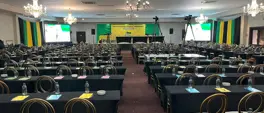SACE insists sanctions meted out to 2 teachers in corporal punishment case effective
Bernadette Wicks
26 February 2024 | 11:15The two teachers were fined and a ruling that their names be removed from the roll of educators was issued but this was stayed for a period of ten years. The Centre for Child Law is now challenging the decision in the courts, arguing the teachers undergo some form of rehabilitation.
JOHANNESBURG - The South African Council for Educators (SACE) isn’t budging on what civil society groups have labelled the “shockingly lenient” sanctions meted out on two teachers for using corporal punishment, insisting they’ve proved effective.
The teachers were fined and a ruling that their names be removed from the roll of educators was issued but this was stayed for a period of ten years, provided they weren’t found guilty of misconduct again during this time.
The Centre for Child Law is now challenging the decision in the courts and argues, among others that the council ought to have considered ordering that the teachers undergo some form of rehabilitation.
One of the children involved in this case, a then seven-year-old boy was hit in the head with a PVC pipe by his teacher and had to be hospitalised; while the other, a then ten-year-old girl was slapped and beaten by hers and left bleeding from her ears.
The centre wants both matters sent back to SACE for reconsideration.
It was, however, unsuccessful in the High Court and so has now turned to the Supreme Court of Appeal (SCA) with an appeal bid, which was heard on Monday.
SACE, in its opposing papers, maintains that the sanctions meted out in this matter have “proven to be an effective deterrent” and that neither of the teachers involved has breached the code of ethics again since.
It further maintains that the matter is in any case now moot and that it wouldn’t be in the best interests of the children if they had to “relive the matters” now.
SACE is also cross-appealing the order the High Court handed down insofar as it does direct them to revise their sanctions policy.
Get the whole picture 💡
Take a look at the topic timeline for all related articles.















